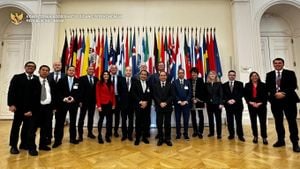Germany is bracing for its federal elections set for February 23, 2025, amid significant economic challenges, with the nation facing two consecutive years of recession. The elections are particularly pertinent as they arrive just months after the dissolution of Chancellor Olaf Scholz's coalition, raising stakes not only for Germany but also for its European partners, particularly France.
Recently, reports indicate Germany's economy, often regarded as the "locomotive of Europe," is under severe strain, contracting its GDP for the second straight year. The country's trade relationship with France, being Germany's largest trading partner, has many French officials watching the elections closely. Initial surveys suggested the ruling Social Democratic Party (SPD), led by Scholz, is trailing behind the conservative CDU/CSU alliance, and the far-right AfD is gaining momentum, indicating potential shifts within the political backdrop.
The CDU, with its candidate Friedrich Merz, proposes significant tax cuts as part of its platform. These include reducing corporate tax rates to 25% and abolishing the solidarity tax, historically used to support the reunification of Germany. The party also advocates for the continuation of the debt brake, which limits government borrowing. Merz's agenda aims to revitalize the German economy by incentivizing senior citizens to remain in the workforce and introducing tax exemptions on overtime.
Scholz's SPD, attempting to regain ground, is pushing for initiatives like promoting "Made in Germany" products with tax incentives and creating a €100 billion investment fund to spur innovation and ecological transition. This plan aims to stimulate economic growth, particularly after the setbacks following the invasion of Ukraine, which has severely impacted European energy supplies.
The AfD's platform focuses on radical changes, such as withdrawing from the euro, with proposals to reinstate the Deutsche Mark. They also call for significant tax reductions, particularly eliminating the solidarity tax and lowering income tax rates. Their agenda reflects increasing nationalist sentiments and the rise of far-right ideology within the electorate, particularly in the wake of social tensions exacerbated by recent violent incidents linked to immigration.
The Greens, another significant player, aim to modernize the debt brake and insist on ending coal use by 2030. They propose substantial investments in renewable energy and infrastructure, positioning themselves firmly against nuclear energy and promoting sustainability. Their approach indicates a commitment to addressing climate issues, appealing to younger and more environmentally conscious voters.
Meanwhile, the Left Party (Die Linke) advocates for extensive industrial investment and intends to raise taxes on wealth and large corporations. They resist the debt brake, arguing it hampers necessary investments for social services and infrastructure. They envision transition strategies focused on moving away from fossil fuels and promoting renewable energy sources.
Voters' sentiments reflect increasing concerns over immigration and security, especially following the tragic events at the Christmas market in Magdeburg, which left six dead and 300 injured. This attack heightened public fears and facilitated the rise of the AfD, especially among residents feeling insecure and marginalized by alleged governmental mismanagement.
Although Merz has publicly distanced himself from coalition talks with the AfD, the party's growing popularity complicates the political terrain. Demonstrations against potential partnerships with the far-right reflect deep divisions within society over Germany's identity and immigration policies.
Indeed, the results of these elections will not only shape the future of the German economy but could also redefine Germany's role within the European framework. The shifting political landscapes pose questions about the stability and unity of the European Union, particularly as it navigates economic recovery post-pandemic, war-driven energy crises, and rising tensions of populism.
Political analysts project significant instability regardless of the outcome as key parties contemplate coalition dynamics. Given the varied platforms focused on economic recovery and the social fabric of German society, voters will have to weigh their priorities carefully. Such substantial choices could lead to lasting impacts on both Germany's domestic agenda and its international relations.



